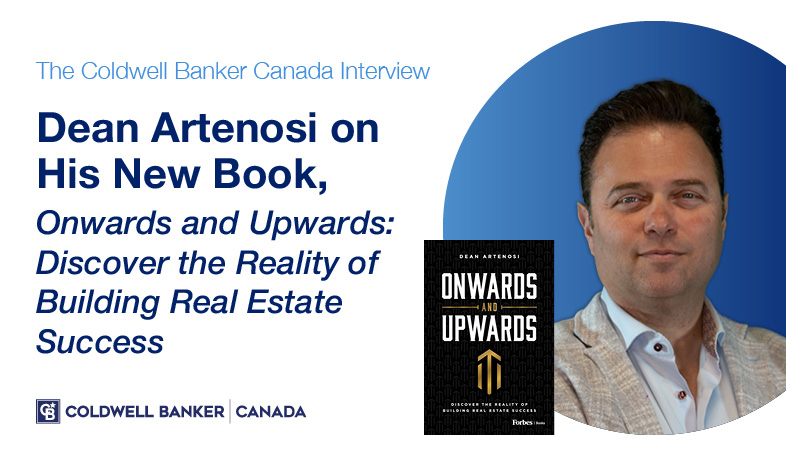Dean Artenosi, Broker/Owner of Coldwell Banker The Real Estate Centre, has a new book out.
Onwards and Upwards: Discover the Reality of Building Real Estate Success is published by Forbes. The book is intended as a course correction for those who view a career in real estate as an easy path to quick money, fame, or both. It offers substantial advice on generating lasting wealth for clients and agents alike, as well as lessons on risk and relationship building. It illustrates that an entrepreneurial mindset is key to envisioning and achieving success as an agent or developer. Artenosi’s goal in the book is to re-kindle a love of all the aspects of real estate work, to breathe life back into what he believes is a noble calling and a great adventure. We sat down with Artenosi to get a bit of a sense of the book and of the author himself. The conversation has been edited slightly for length.
Coldwell Banker Canada: One of the stories in the book that most readers will relate to is the story about the day as a school student you realized that you could—and really liked to—sell fundraising chocolates door to door. Not all door-to-door chocolate sellers have such warm memories!
Dean Artenosi, The Real Estate Centre: That was at St. Robert in Thornhill, Ontario. I learned how competitive I was! There was a $500 prize for most chocolates sold. That was my goal. I talked to my father about it. He got right behind it. He was in real estate and back in those days you went door to door to find your prospects. There was no internet. He appreciated the chance to coach me. One of the first things I did was to network with family members and ask them if they could take a couple of boxes and sell them to some of their friends.
CB: What was your door-to-door pitch? How did you do it?
DA: Basically, my pitch was, “hello, I’m representing St. Robert and we’re trying to raise money for the school. I have a goal, as well. I’m trying to win a prize of $500 that I will apply to my schoolbooks next year.”
CB: You made it emotional?
DA: People buy on emotion and justify with logic, for sure! I wasn’t the top student in my class, but I was the No. 1 chocolate bar salesperson. In a way, I just kept going door to door. In my early 20’s, I started a company with a line of environmentally safe cleaning products that we sold door to door.
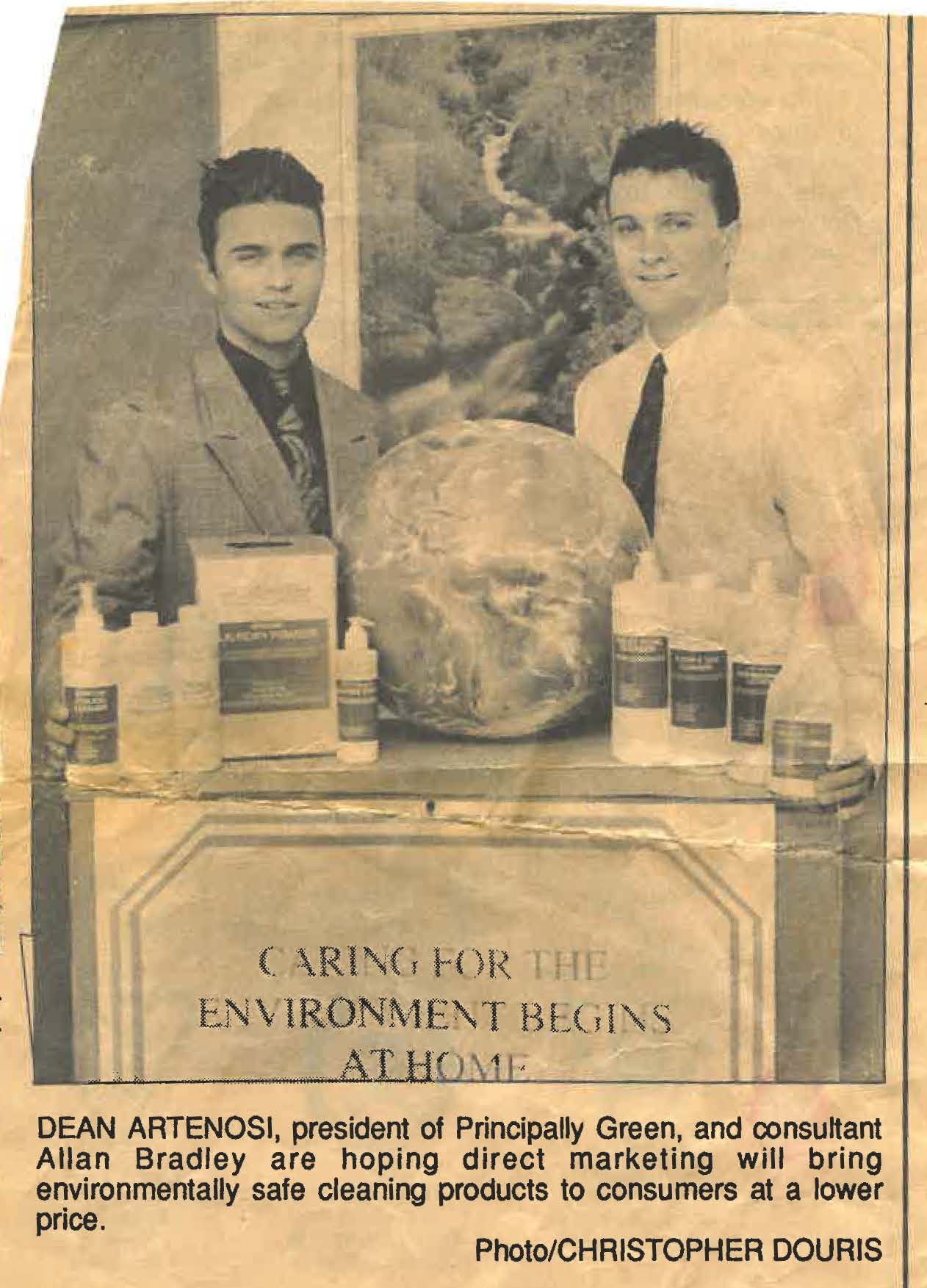
A young Dean Artenosi, left, in a local newspaper clipping as he launched Principally Green environmental products.
CB: Are any of those door-to-door skills still relevant in today’s technological world, or have they become obsolete and we can now afford to live without them?
DA: I think we’ve moved away from those skills. Yes, they are still valuable. As I say in the book, real estate, for all its talk about location, location, location, is and will always be about people. Social media gives you exposure. It creates awareness. Realtors can have online campaigns, but why is it that some realtors close more deals than others? It’s because they have sales techniques and can deal with people. Nothing beats interpersonal skills. Some of it might be inherited or natural, but you can learn it. Like I say in the book, you must train to get and keep those skills.
CB: Honest question—why does the world need another book on success in real estate?
DA: There is money to be made and wealth to be created—for your clients and for yourself—by having the right mindset. That mindset is about providing ultimate service to your clients and building a successful sales practice from the things you learn from the ground up. My book is about seeing the difference between the real wealth in real estate versus the versions that catch people up in all the rah-rah and the downlines and the multi-level marketing schemes. All those aesthetics just don’t matter.
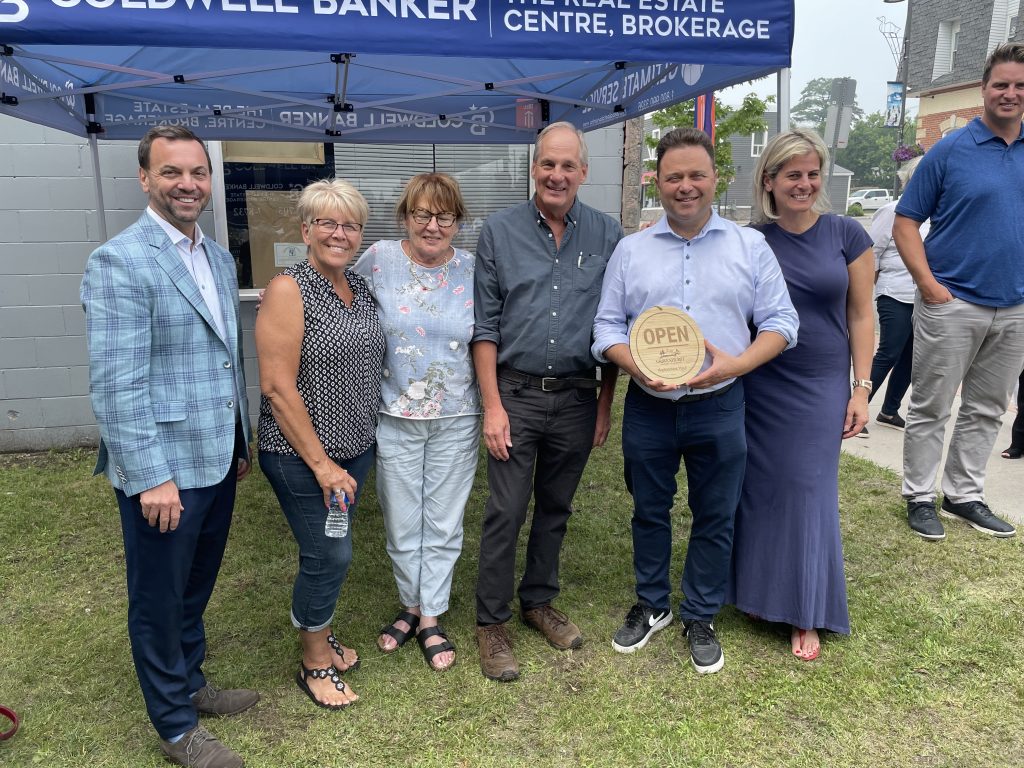
Artenosi and wife Tania celebrate the grand opening of the TREC’s Gravenhurst, ON, office with (l-r) Tim Hudak, Sandy Cairns, Penny Varney, and Randy Jorgensen.
CB: Okay, was going to ask this later, but let’s do it now, because you just mentioned that your book is about seeing the difference between real wealth and other kinds. References to seeing and vision are everywhere in your book. A real estate expert must see what isn’t there yet, you say, either in terms of neighbourhood that will have a better day or a piece of property whose use can be changed. You tell us the story of what your father was able to see in a plot of undeveloped land on unheralded Georgian Bay. How do you get the superpower to see the invisible?
DA: I have found that the biggest gains in real estate are to be realized when you change the use of real estate. I give a lot of examples in the book of how to see those changes. But it comes down to doing the work to get additional perspectives. What you see in front of you is not all there is. What can a rundown home in a transitional neighbourhood become? How about a piece of real estate near a future public transit line? Do you know what your municipality’s official plans are? Do you see the potential in corner lots? Do you enlarge your field of vision in these ways, and then do you see it through?
CB: See it through—another reference to vision.
DA: Yes. Staying true to your vision is essential.
CB: What’s the attraction of corner lots?
DA: The corner lot is always the kingpin. You have access on both sides of the road. It lets you imagine more uses for the land.
Try turning the people and places that snooty real estate agents write off as the “nothings” into “somethings” of real value. – from Onwards and Upwards: Discover the Reality of Building Real Estate Success
CB: Speaking of visionaries, let’s switch to fiction for a second. In your book, you testify to the enormous impact that Mordecai Richler’s The Apprenticeship of Duddy Kravitz had on you. That namechecking doesn’t happen in too many books on real estate, does it?
DA: I read that book in Grade 12. Mrs. Heslip’s class. I think she could see how much I related to that book, how much I was mesmerized by it—the story, the entrepreneurism, my being from an immigrant family, too. It really got in me. I wanted to be a developer from Grade 12 on.
CB: At the end of the story, Duddy is land-rich, but you could say, he had too much of his cash flow tied up in his equity. That’s a recurrent lesson in your book.
DA: I remember a bank manager telling me that you can’t spend dirt. That stuck with me. Yes, cash flow is important. But the really valuable lesson is that you must always have an eye on diversifying your holdings.
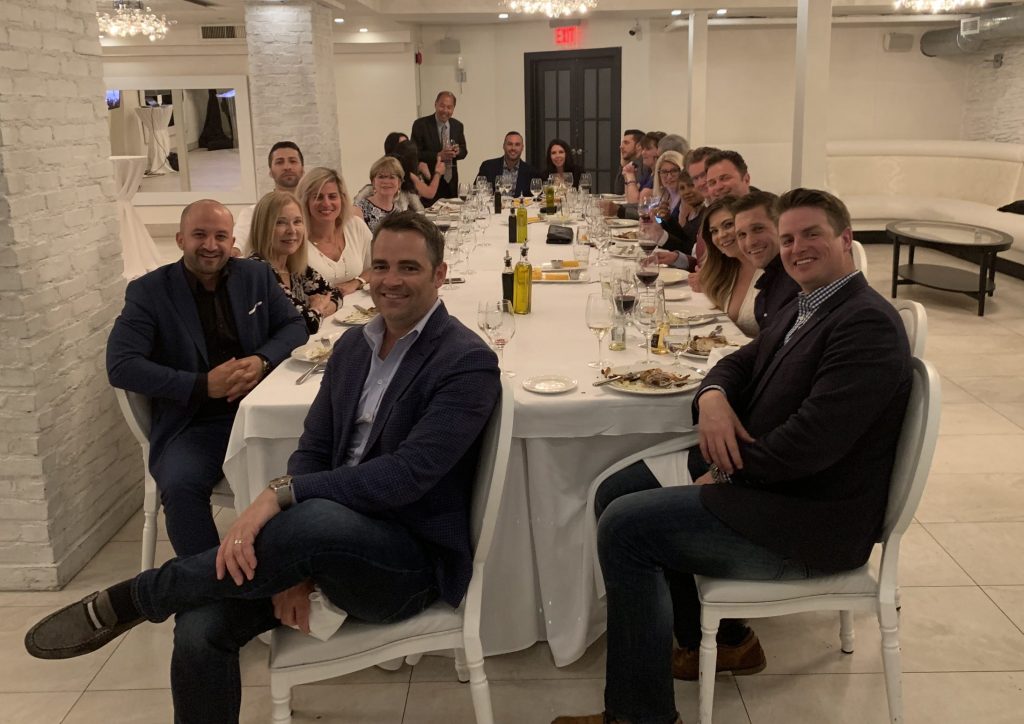
A dinner hosted by the Artenosis to celebrate Coldwell Banker International Award Winners from the various TREC offices.
CB: What’s a good mistake that you’ve made?
DA: There are times I haven’t been diversified enough, but I don’t think that’s what you’re asking. I talk about this in more detail in the book, but I remember losing my first OMB [Ontario Municipal Board] planning hearing. I had tried to shoe-horn in a development proposal. If I had listened more and compromised more and taken a more conciliatory approach, I likely wouldn’t have lost that hearing. It was an expensive lesson. But, in the long run, it helped me create a skillset that is the skillset of a team player with a purpose. The purpose is to help people, to solve problems and do what is right for the customer. Never worry about what the next person is making in a deal or you will never make anything yourself. Better to get a small piece of something than a big piece of nothing.
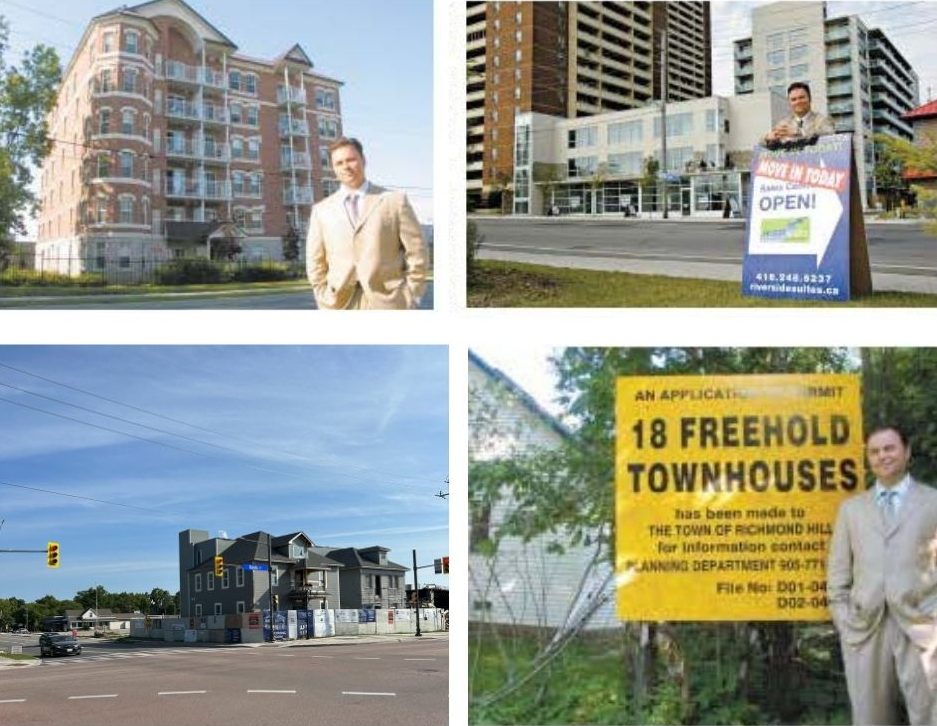
A selection of communities Artenosi has developed through the Arten Group.
CB: Right now, in the Canadian housing market, the issue of affordability is very complex and seemingly intractable. What can be done, including, what can the real estate industry do, to make more homes more affordable for more people?
DA: I think there are policy changes coming. There’s a bill [in Ontario] that will allow you to have two or three apartments on your property. Now, some people don’t like that. Years ago, they didn’t like that because they didn’t want to have a so-called rental property in the neighbourhood. The reality is many people are living like that. There are two or three families. When I built my home here, I had the basement apartment rented, I had the in-law nanny suite rented. I rented out everything I could to generate revenue. I do think real estate agents need to look at creating supplementary income for property owners.
CB: Is that one of the reasons your book underlines the importance for real estate agents of working with buyers, and not taking the easier seller’s route?
DA: It’s harder to work on the buyer’s side. If you have that vision for what a property could be, and if you can help your client execute that plan, then you learn how to really create some wealth for your client. If you can do it for them, you can do it for yourself. The book has more than a few of those real-life stories.
CB: Your book is full of advice and full of stories. Readers meet Mrs. Heslip and the neighbour who opposed your development who later came around. They meet Ruth and see how you helped her. (That’s a story that’s hard to forget.) They meet your aunt, who helped provide the title of the book, they meet your parents and your uncles. You take us to Italy to see the shack your grandfather lived in.
DA: You must never forget where you come from.
CB: Italy is a big character in your story.

Artenosi and family on a memorable trip to Ortona, Italy, in 2013. He came back with a Canada tattoo.
DA: Yes, so is Canada. I remember a family vacation we took in 2013. We took the kids and went to see more of my wife Tania’s side of the family. Her parents’ village is close to Ortona. There’s a graveyard there, a Canadian graveyard for all the soldiers from Canada who fought there in the Second World War. It was incredible. It was so emotional. I don’t have the words to explain it. I left so inspired to be a Canadian. I actually ended up getting a Canadian flag tattooed on my ankle. Anyways, that whole history resonates with me. It has inspired the Canadian Dream in me, it really has. I want to make a difference for good in people’s lives. That’s also the reason for the book.
CB: Who has the most to gain by ordering and reading your book?
DA: Real estate agents and real estate investors, new agents and experienced agents, agents that have been led in the wrong direction away from ultimate service and toward multi-level marketing schemes and so-called profit-sharing concepts. It’s never too late to learn all the components of real estate from start to finish.
CB: If the book is made into a movie, who plays you?
DA (laughing): DiCaprio? I also love De Niro and Pacino!
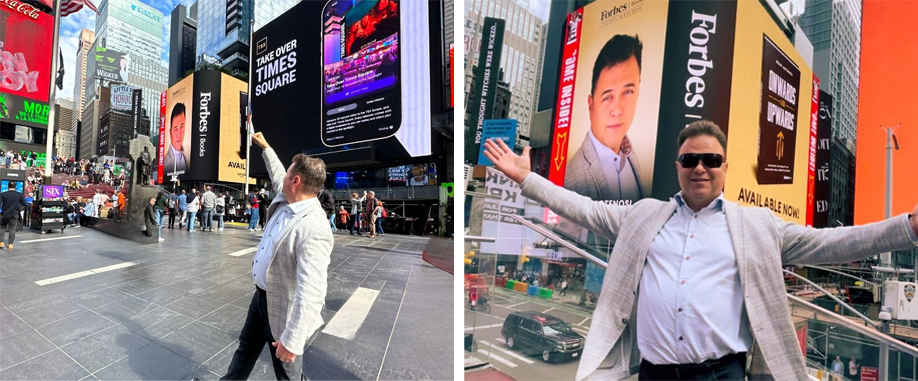
Artenosi in Times Square in Manhattan in 2023 for debut of billboard ad for “Onwards and Upwards”.
Editor’s note: Onwards and Upwards: Discover the Reality of Building Real Estate Success is published by Forbes. Order it here.


 Facebook
Facebook
 X
X
 Pinterest
Pinterest
 Copy Link
Copy Link
